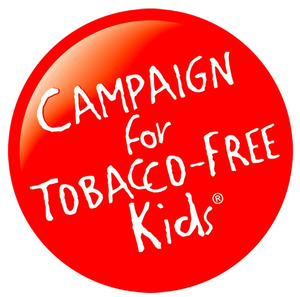WASHINGTON, March 27, 2018 /PRNewswire-USNewswire/ -- Seven public health and medical groups, including Campaign for Tobacco-Free Kids, and several individual pediatricians, filed suit today in federal court in Maryland challenging a U.S. Food and Drug Administration (FDA) decision that allows electronic cigarettes and cigars – including candy-flavored products that appeal to kids – to stay on the market for years without being reviewed by the agency.
The lawsuit was filed by the American Academy of Pediatrics and its Maryland chapter, American Cancer Society Cancer Action Network, American Heart Association, American Lung Association, Campaign for Tobacco-Free Kids, Truth Initiative and five individual pediatricians.
Although the groups strongly support the FDA's new efforts to reduce nicotine levels in cigarettes to minimally or non-addictive levels, they also believe that the FDA's August 2017 decision to exempt e-cigarettes and cigars from agency review for years to come is unlawful and harms public health.
The lawsuit contends that the FDA's decision leaves on the market tobacco products that appeal to kids, deprives the FDA and the public of critical information about the health impact of products already on the market, and relieves manufacturers of the burden to produce scientific evidence that their products have a public health benefit.
The FDA's decision to delay product reviews leaves young people more vulnerable to kid-friendly e-cigarettes and cigars that may lead to a lifetime of tobacco addiction. FDA review "should remove from the commercial marketplace those tobacco products that pose the greatest health risks, particularly those targeted at children and teenagers," according to the lawsuit. In addition, the FDA's decision "will hinder the development of the science needed to understand, and to educate the public about, which products actually do promote smoking cessation and how they can be marketed without exposing young people to unnecessary risk."
The need for the FDA to review e-cigarettes now on the market has been underscored by the recent surge in popularity of JUUL, which has become the best-selling e-cigarette brand and is reported to be widely used by teens. JUUL e-cigarettes look like USB flash drives; they are sold in flavors including mango, crème brulee and fruit medley; and the manufacturer claims that each JUUL cartridge contains as much nicotine as a pack of cigarettes. According to widespread news stories, reports from educators and documented social media posts, JUUL e-cigarettes have become very popular among high school and college students (see reports by The Boston Globe, Pittsburgh Post-Gazette, NPR and WJLA TV in Washington, DC). Despite these reports, the FDA has taken no action regarding JUUL.
The FDA in August 2016 implemented a new rule (known as the "deeming rule") extending its jurisdiction to e-cigarettes, cigars and other previously unregulated tobacco products. However, in August 2017, the FDA delayed a key provision of the rule that required manufacturers of products then on the market to provide critical information to the FDA about each product and undergo an FDA review of the product's impact on public health, including whether it appeals to kids. The FDA delayed the deadline for filing applications until August 2021 for cigars and other newly-regulated combustible products and until August 2022 for e-cigarettes. The FDA has also said that these products will remain on the market indefinitely during the review process and did not set a deadline for completing its review.
The health groups' lawsuit contends that the FDA's lengthy delay of product review deadlines exceeds the agency's authority under the Family Smoking Prevention and Tobacco Control Act (the 2009 law that established FDA oversight of tobacco products). It also contends that the FDA's decision violates the Administrative Procedure Act because the FDA did not give the public an opportunity to comment on the change and did not articulate an adequate factual basis for this radical change from the deadlines the FDA itself established in the deeming rule.
The FDA "offered no meaningful justification for ripping a hole in the statutory framework by exempting, for more than half a decade, newly deemed products from premarket review – review FDA previously described as 'central' to the regulatory scheme Congress enacted for tobacco products," the lawsuit states.
The lawsuit raises particular concerns about tobacco products that are popular among kids. Numerous government surveys show that e-cigarettes have become the most commonly used tobacco product among youth, surpassing traditional cigarettes. The 2016 National Youth Tobacco Survey found 11.3 percent of high school students use e-cigarettes, compared to 8 percent who use regular cigarettes. In addition, high school boys smoke cigars at a slightly higher rate than cigarettes. Both e-cigarettes and cigars are sold in a wide array of candy and other flavors, such as gummy bear, cotton candy and chocolate.
A 2016 Surgeon General's report concluded that youth use of nicotine in any form, including e-cigarettes, is unsafe, can cause addiction and can harm the developing adolescent brain. A January 2018 report by the National Academies of Sciences, Engineering and Medicine concluded, "There is substantial evidence that e-cigarette use increases risk of ever using combustible tobacco cigarettes among youth and young adults."
The public health groups are being represented on a pro bono basis by the law firm of WilmerHale, lawyers at Democracy Forward Foundation and the legal staff of the Campaign for Tobacco-Free Kids.
Today's filing was made in the U.S. District Court for the District of Maryland.
SOURCE Campaign for Tobacco-Free Kids
Related Links
WANT YOUR COMPANY'S NEWS FEATURED ON PRNEWSWIRE.COM?
Newsrooms &
Influencers
Digital Media
Outlets
Journalists
Opted In





Share this article